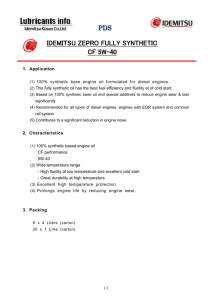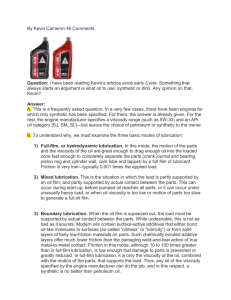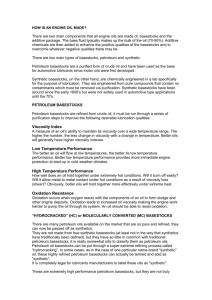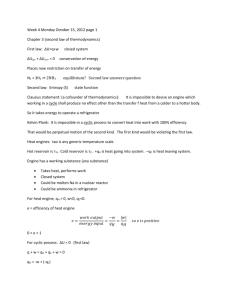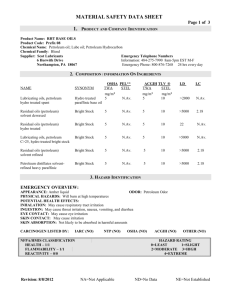DO SYNTHETICS REQUIRE A 3000 MILE OIL CHANGE
advertisement
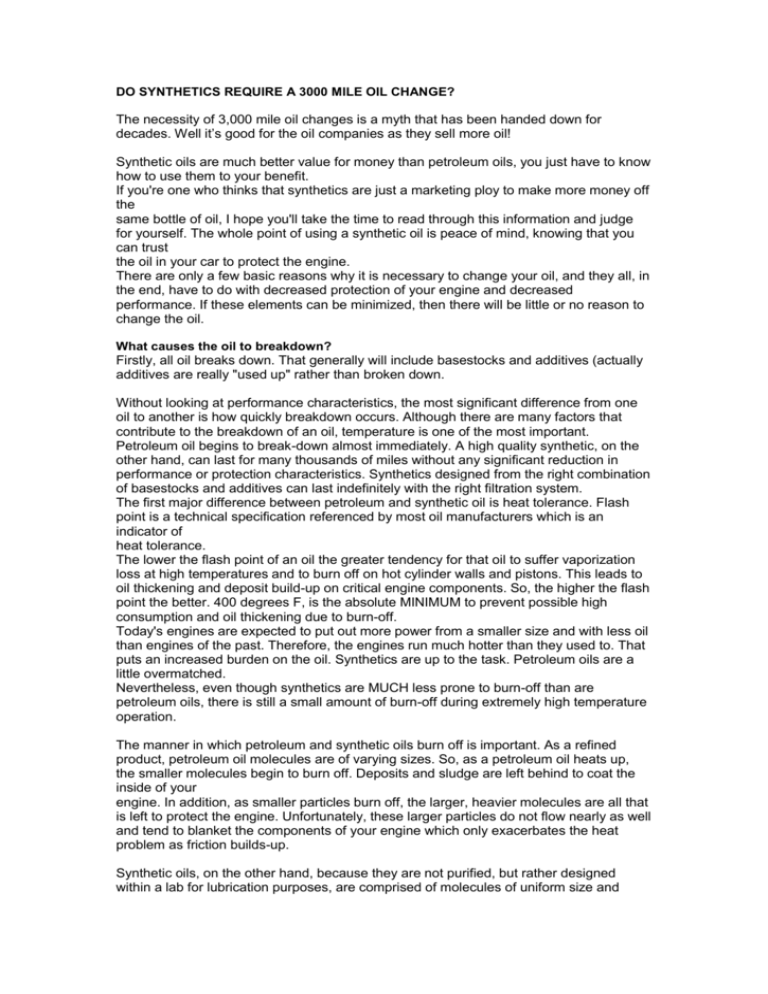
DO SYNTHETICS REQUIRE A 3000 MILE OIL CHANGE? The necessity of 3,000 mile oil changes is a myth that has been handed down for decades. Well it’s good for the oil companies as they sell more oil! Synthetic oils are much better value for money than petroleum oils, you just have to know how to use them to your benefit. If you're one who thinks that synthetics are just a marketing ploy to make more money off the same bottle of oil, I hope you'll take the time to read through this information and judge for yourself. The whole point of using a synthetic oil is peace of mind, knowing that you can trust the oil in your car to protect the engine. There are only a few basic reasons why it is necessary to change your oil, and they all, in the end, have to do with decreased protection of your engine and decreased performance. If these elements can be minimized, then there will be little or no reason to change the oil. What causes the oil to breakdown? Firstly, all oil breaks down. That generally will include basestocks and additives (actually additives are really "used up" rather than broken down. Without looking at performance characteristics, the most significant difference from one oil to another is how quickly breakdown occurs. Although there are many factors that contribute to the breakdown of an oil, temperature is one of the most important. Petroleum oil begins to break-down almost immediately. A high quality synthetic, on the other hand, can last for many thousands of miles without any significant reduction in performance or protection characteristics. Synthetics designed from the right combination of basestocks and additives can last indefinitely with the right filtration system. The first major difference between petroleum and synthetic oil is heat tolerance. Flash point is a technical specification referenced by most oil manufacturers which is an indicator of heat tolerance. The lower the flash point of an oil the greater tendency for that oil to suffer vaporization loss at high temperatures and to burn off on hot cylinder walls and pistons. This leads to oil thickening and deposit build-up on critical engine components. So, the higher the flash point the better. 400 degrees F, is the absolute MINIMUM to prevent possible high consumption and oil thickening due to burn-off. Today's engines are expected to put out more power from a smaller size and with less oil than engines of the past. Therefore, the engines run much hotter than they used to. That puts an increased burden on the oil. Synthetics are up to the task. Petroleum oils are a little overmatched. Nevertheless, even though synthetics are MUCH less prone to burn-off than are petroleum oils, there is still a small amount of burn-off during extremely high temperature operation. The manner in which petroleum and synthetic oils burn off is important. As a refined product, petroleum oil molecules are of varying sizes. So, as a petroleum oil heats up, the smaller molecules begin to burn off. Deposits and sludge are left behind to coat the inside of your engine. In addition, as smaller particles burn off, the larger, heavier molecules are all that is left to protect the engine. Unfortunately, these larger particles do not flow nearly as well and tend to blanket the components of your engine which only exacerbates the heat problem as friction builds-up. Synthetic oils, on the other hand, because they are not purified, but rather designed within a lab for lubrication purposes, are comprised of molecules of uniform size and shape. OTOR OIL BURN OFF Even if a synthetic oil does burn a little, the remaining oil has the same chemical characteristics that it had before the burn off. There are no smaller molecules to burn-off and no heavier molecules to leave behind. Moreover, synthetics contain far fewer contaminants than petroleum oils since they are not a refined product. As a result, if oil burn-off does occur, there are few, if any, contaminants left behind to leave sludge and deposits on engine surfaces. Obviously, this leads to a cleaner burning, more fuel efficient engine. It is also important to note that synthetics do a much better job of "cooling" engine components during operation. Because of their unique flow characteristics, engine components are likely to run 10 to 30 degrees cooler than with petroleum oils. This is important, because the hotter the components in your engine get, the more quickly they break down. What is Additive Depletion? Additive depletion comes into play when discussing oil drain intervals. If additives are depleted, the oil cannot effectively do it's job. So, the oil must be changed. It is true that the additives in many oils begin breaking down after only a few thousand miles. What needs to be recognized is that there are different quality "grades" of additives just as there are different quality grades of just about any other product that you buy. Many oil companies are using the same additives in their oils as all of the other companies because they are cheap. That's why the oil costs less. You get what you pay for! If they were willing to spend the money on top-quality additive packages for their oils, every synthetic on the market would be recommended for extended drain intervals, and they would all be more expensive. The technology has been around for years. The problem is that oil companies make more money selling a cheaper grade oil and making sure that you change it more often. So, what do the oil additives in your oil do? Viscosity Retention Additives are used to maintain a stable viscosity over a wide temperature range. Synthetics need less of these additives than petroleum oils do because synthetic basestocks maintain a fairly stable viscosity by themselves. Also, the additives that are used are more stable than those used in petroleum oils. As a result, petroleum oils must be changed often because they quickly become unable to retain the viscosity levels necessary to protect your engine (their high temperature viscosity drops off). Synthetic oils don't really have that problem because both the basestocks and the additives are more stable. Contaminant Control Additives are also used to keep oil contamination in check and to keep it from damaging your engine. These additives keep potentially wear causing contaminants suspended and contained in your oil so they don't cause excessive wear or deposit build-up within your engine before your filter can remove them. Synthetics generally have higher additive treat rates than petroleum oils (in addition to using higher quality, more expensive additives), so they can perform this contaminant control function for a much longer period of time than a petroleum oil can. How Does Oil Contamination Occur? Of course, additive depletion and degredation of oil basestocks are not the only things that cause an oil to need changing. There is also the issue of contamination. Oil will be contaminated in three major ways. One will be through debris that comes in through the air intake. Once it makes it through the air filter, it ends up in your oil. Once in your oil, it starts damaging your engine. The second source of contamination will be metal shavings from the inside of your engine. The lesser the quality of the oil, the higher percentage of these shavings because there will be more wear inside the engine. The third source of contamination will be from combustion by-products. Combustion byproducts will generally raise the acidity of your oil, which causes corrosion in your engine. In addition, they will be left behind as the engine oil burns off and will collect on the inside of your engine as deposits.
